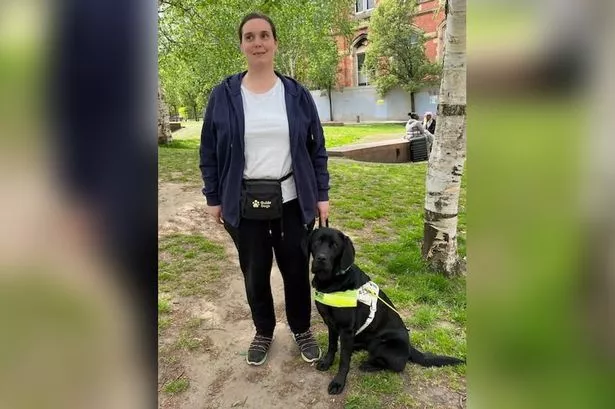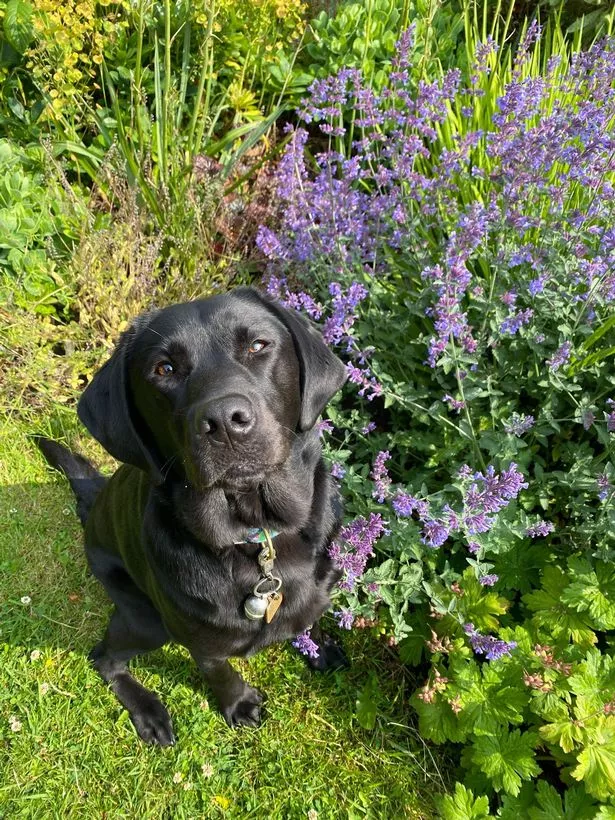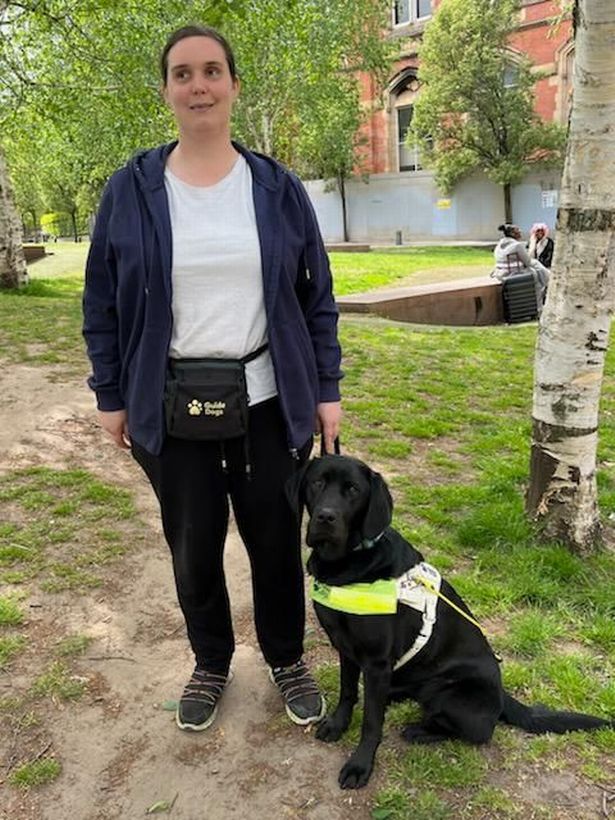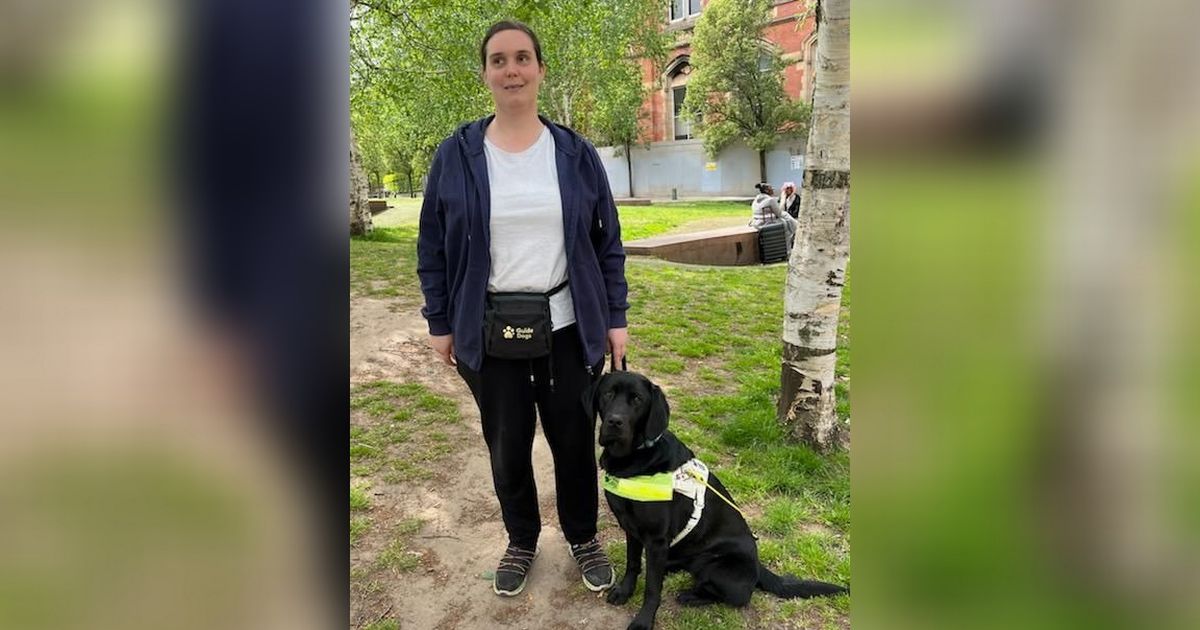Jennie Harrison, 35, from Didsbury says taxi drivers regularly cancel her journey at the last second, or flatly-refuse to take her, when they see she has a guide dog Jennie Harrison, 35, from Didsbury, with her guide dog, Brandy
Jennie Harrison, 35, from Didsbury, with her guide dog, Brandy
A woman says she’s been left feeling like a “second-class citizen” following her experiences with cab drivers who refuse to carry her after spotting her guide dog.
Jennie Harrison, 35, from Didsbury, told the Manchester Evening News that last-second cancellations, and even complete refusals to let her guide dog into their cars, are sadly a regular occurrence. However Jennie, who has been blind since birth, stresses that while most of her taxi journeys are without incident, several drivers have made her feel “unwelcome” and “unwanted” by their actions.
According to the charity Guide Dogs, access refusals from businesses and services—including cafés, shops, and taxis—to visually impaired people because they are accompanied by their guide dog are almost always illegal. However, Jennie says that for her and many others, this is still a regular occurrence with taxis.
Jennie says she has made complaints to Uber on several occasions. However, the number of drivers operating in Manchester who are registered in other parts of the country makes it difficult to resolve her complaints.
Jennie, who studies counselling at college and volunteers for the Samaritans, said: “Most journeys in taxis and private hire vehicles that I have are perfectly great; they’re absolutely fine. But unfortunately, it’s the minority that aren’t great that end up sticking in my head, and that causes me anxiety.
“I generally use Uber, and you can report it to them. However, it’s generally needed that you report it to the local authority that the driver is registered with.
“And herein lies the problem, that drivers in Manchester can be registered to any authority across the country because they can go anywhere to take their test. And each local authority has a different policy, and different ways they enforce that law and different levels of punishment.
“To report someone I have to chase a different local authority every time, whereas if they were all under the one local authority, I would be assured that it would be dealt with in the correct way.
“I would know exactly where to go to report it, and that I wasn’t chasing up different local authorities with different policies.”
 Jennie Harrison, 35, from Didsbury, relies on taxis for her independence
Jennie Harrison, 35, from Didsbury, relies on taxis for her independence
Earlier this year, Andy Burnham criticised the taxi licensing system in the country as ‘demonstrably broken’ and announced ambitious proposals to revolutionise the service in Greater Manchester.
The mayor launched his ‘backing our taxis’ initiative, urging the Government to pass new legislation to clamp down on out-of-area working. This contentious issue involves drivers obtaining licences from authorities perceived as less stringent and then operating elsewhere in the country.
More than 40% of private hire taxis in Greater Manchester are licensed beyond the area’s 10 boroughs, with Wolverhampton accounting for 11% of the country’s minicabs. According to the mayor, this challenge complicates the enforcement of safety regulations within the taxi industry.
I feel like a ‘second-class citizen’
In an incident that happened just a few weeks ago, Jennie described how one taxi driver flatly refused to take her after spotting Brandy, a guide dog that’s been with her for the past three years.
“I went outside and I was awaiting my taxi. When it came he saw Brandy he said, ‘No, no dogs.’ And drove off,” said Jennie.
“That’s something that upsets me. I want them to realise that they are just leaving me at the kerb, and that I have appointments to go to and I have a life.
“When I get a refusal like that just due to my life, it’s very emotional for me. It makes me unwanted, unwelcome, and like a second-class citizen.
“A lot of the drivers say to me, ‘You should have ordered Uber Pets.’ But I say to them she’s not a pet and why should I need to pay more, because Uber Pets is more expensive, to go about my life as a disabled person.
“And sometimes there are refusals I can’t prove. So, on the app, I can hear the taxi is 500 feet away and then that it’s arrived. And then a second later, it’s gone, and the Uber app is requesting another one, and I highly suspect that the driver’s gone because they’ve seen the dog. But I can’t prove it.
“Proving it is difficult as you need something like video evidence, if not it’s just your word against the drivers.”
 Jennie says having Brandy has been ‘life-changing’
Jennie says having Brandy has been ‘life-changing’
Jennie added: “Having a guide dog is life-changing in multiple ways. It makes getting out an awful lot easier. It gives me the confidence to go out and do things I need to do.
“It gives me the independence that I really enjoy. It means I can go out for pleasure rather than just when I have to, so I’ll go out for a coffee rather than just going out when I really need to.”
Jennie acknowledges that it’s the minority of drivers who make life difficult for her and other guide dog users, but the current taxi system, allowing drivers registered in other parts of the country to operate in Manchester, is a big part of the problem.
“It needs to be tightened up,” said Jennie.
“The huge range of taxi drivers who are able to work across the country under different local authorities is very confusing. Also, if I have a driver who knows the local area well, then I know that I will be dropped exactly where I want to be dropped, rather than someone who doesn’t know the city centre well.”
‘Oh my god, what’s going to happen this time’
Jennie also acknowledges that even if the Government implemented legislation, it would still not stop drivers from refusing to take guide dog owners, but it would make it easier to complain.
Jennie said: “TFL (Transport for London) have got the model in London where all the taxis are registered under them but it hasn’t solved the problem, because I have friends in London that have similar issues with refusals. But it would make reporting these things a lot easier for me, and it would mean that I would know that the policies would be upheld.”
 Jennie and Brandy
Jennie and Brandy
In Jennie’s experience, some local authorities are stricter than others regarding disciplining or re-educating drivers who have refused to take her but says, “I don’t want to ruin anyone’s livelihood.”
She adds: “I don’t have the energy sometimes. I’ve got enough on with my life than just going around and really pushing it, taking people to court, things like that. I just don’t have the energy, and I suffer from anxiety as well, which really doesn’t help the situation of booking a taxi and thinking, ‘Oh my god, what’s going to happen this time.’
A spokesperson for the UK charity Guide Dogs said: “Sadly, all too many guide dog owners know from experience the failings of England’s licensing system. 58% of guide dog owners have been turned away by a taxi or minicab driver, despite it being against the law.
“Guide Dogs has been calling for a national requirement for taxi and minicab drivers to take part in disability equality training as part of the licensing process, so they understand their legal obligations, and how to assist all their passengers.
“The previous Government committed to introducing training in national minimum standards as part of taxi reform, but no progress has been made. The upcoming English Devolution Bill is an opportunity to make sure that drivers know the law, and prevent debilitating access refusals.”
The charity is spreading awareness around its Open Doors campaign. The campaign encourages guide dog owners to download their app to report instances of access refusals to businesses and services and get support.
The Manchester Evening News has approached Uber for comment.
You can learn more on the Guide Dogs website here.
